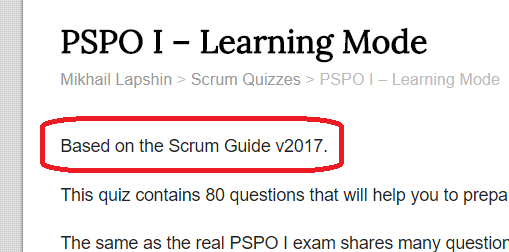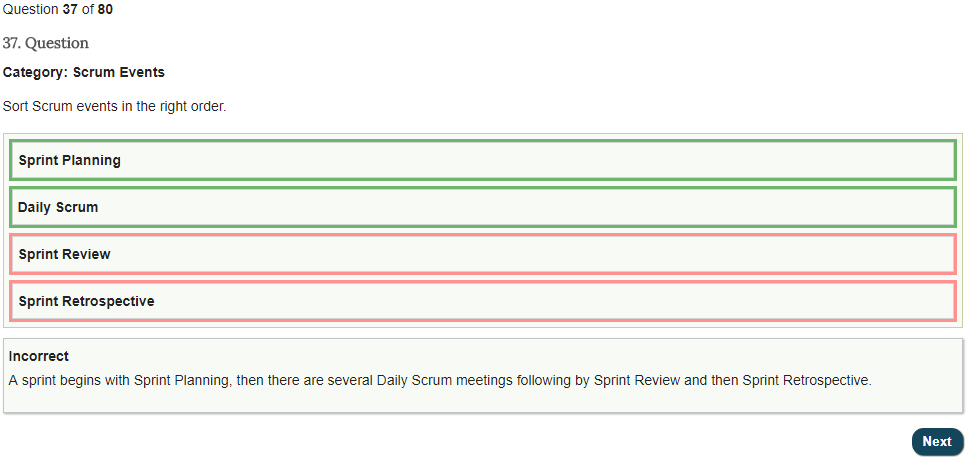This page contains questions about the quizzes and the web site.
Mikhail: Yes, the quizzes are based on the latest Scrum Guide version. I created them in 2015, but I am tracking all the Scrum Guide changes and update the quizzes appropriately. You can find information about the corresponding Scrum Guide version in the beginning of every quiz description.


Mikhail: This is a quiz engine feature. When you press “Check” button for an “Order It” question, it always sets the answers in the correct order and marks in red the answers that were at wrong places.
So, the following happened before the situation shown at the screen shot. The user placed Sprint Retrospective as #3, Sprint Review as #4 and pressed “Check” button. The quiz engine swapped the two last answers and marked them in red.
Mikhail: What about PSM II, the certifications at Scrum.org are changing. The new PSM III is the former PSM II (essay questions + multiple choice) and the new PSM II is the former PSP (only multiple choice questions).
So, now PSM II is simpler than it was before. No more essay questions. The number of questions is just 30, but the questions are tough (think about the hardest questions in PSM I).
PSM II covers wider subject areas: additional questions from PSPO subject area and from Nexus.
Mikhail: As far as I know, the both certifications are equally recognized. However, there are some important differences:
- To get certified with ScrumAlliance it is mandatory to take their course (and pay for it). For PSM I certification no courses required, but you can take their course if you want.
- PSM I exam is harder to pass (but it is still completely manageable). PSM has 80 questions and 85% passing score whereas CSM has only 35 questions and 69% passing score.
So, there are two points to consider when you are choosing between PSM and CSM:
- Do you need a Scrum training? If yes, there is no much difference between the certifications. Look at the available trainings: location, time, reviews, opinions about specific trainer and choose the one that suits you best.
- Do you have extra money for the training (about $1000)? If not, your choice is PSM certification.
Mikhail: At the PSM I page you can find that: “Passwords have no expiration date, but are valid for one attempt only.”
So, when you pay for the exam, the next day you have a password to start the exam. The password has no expiration date.
Mikhail: I created my quiz reading the Scrum Guide and composing questions about every paragraph. So, it is pretty straightforward. It helps to study the Scrum Guide well.
However, my quiz asks nothing about applying Scrum in the real life. Questions about it I name as “second level” questions. They have no direct answer in the Guide, however if you think about it, you should be able to deduce the answer.
Fortunately, the real PSM I exam contains just a few of them. Such questions are the base for the next level PSM certifications. So, I ask people to score about 100% in the open assessments to pass the exam even if the harder questions are answered wrong.
I believe it is possible to create more “second level questions” than direct questions about the Scrum Guide. So, I cannot invent all of them and include into the quiz. However, adding 4-5 “second level” questions into the quiz looks as a good idea.
Hi, about the question of who is responsible for the creation of Definition of Done, I believe we should look back into the Scrum Guide, which says this:
“If it is not an organizational standard, the Scrum Team must create a Definition of Done appropriate for the product.”
There said the Scrum Team, not the Development Team of the Scrum Team.
Very true… So what is correct here?
Hello Mikhail
Thanks for giving the platform for doing the MOCK test to all aspirant preparing from SM & PO.
As you had mentioned on PSPO I™ Preparation Quiz page that that all Question are based on Scrum Guide V2017 and update for v2020 is in progress..
As we know there are few changes from V2017 to V2020 and some of the answer which was currently given and still based on 2017 and not as per 2020.
Appreciate if you can share by when we can expect the updated SCRUM QUIZZES page based on V2020. I am planning to appear for PSPO in coming month.